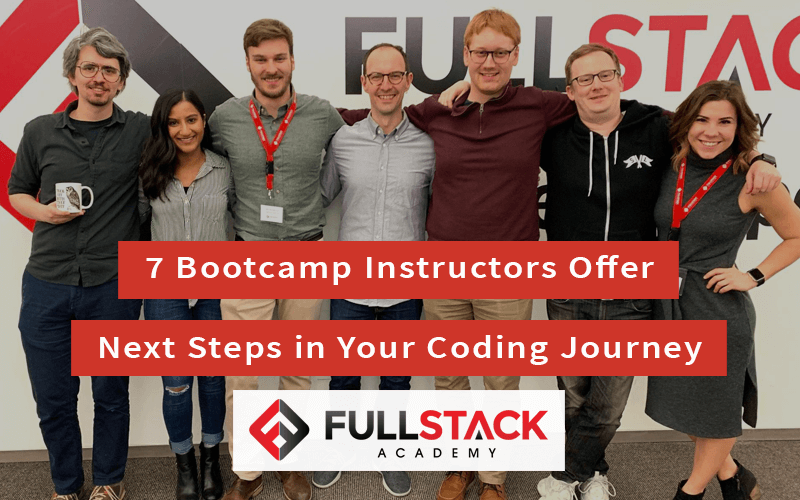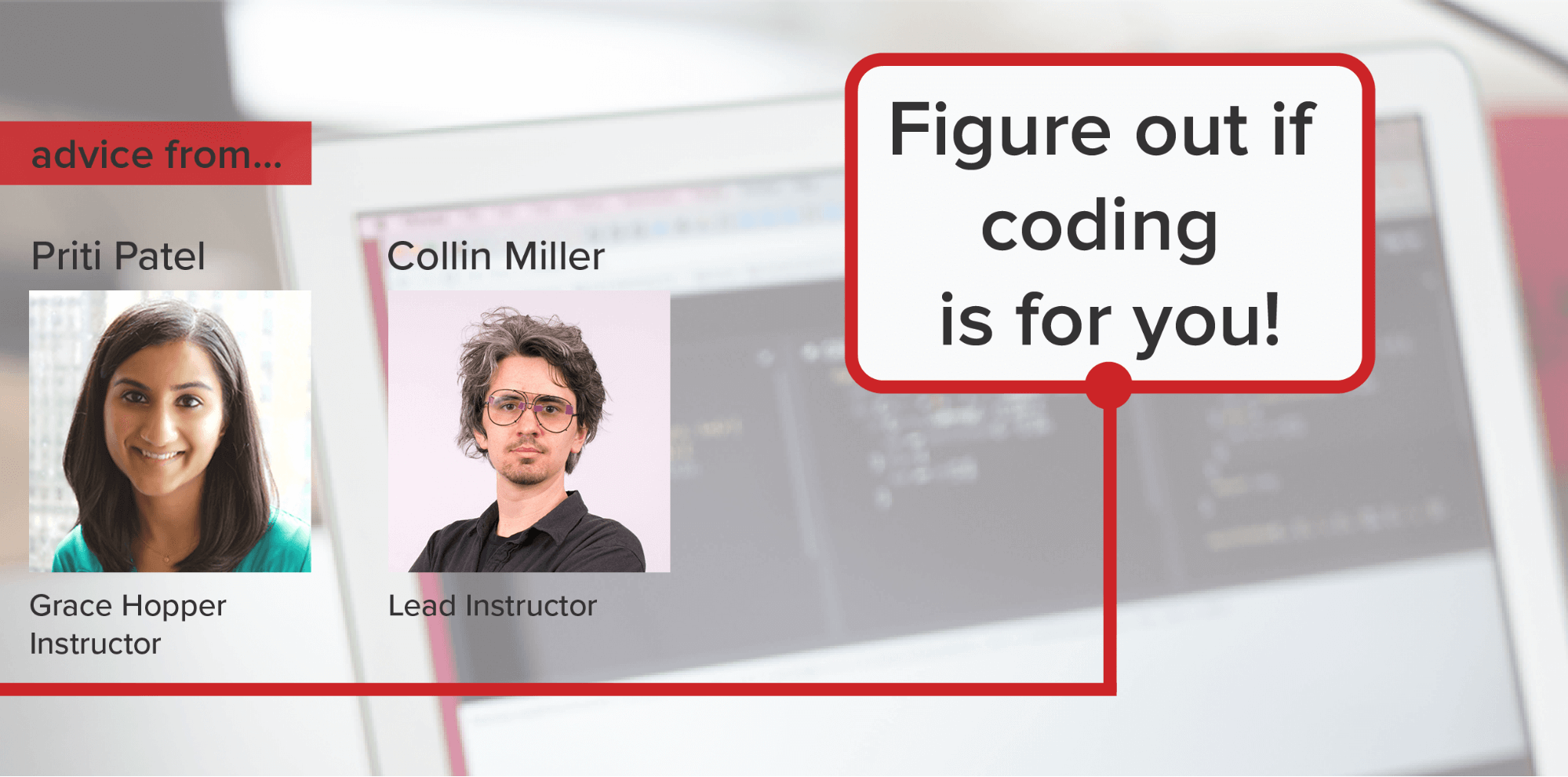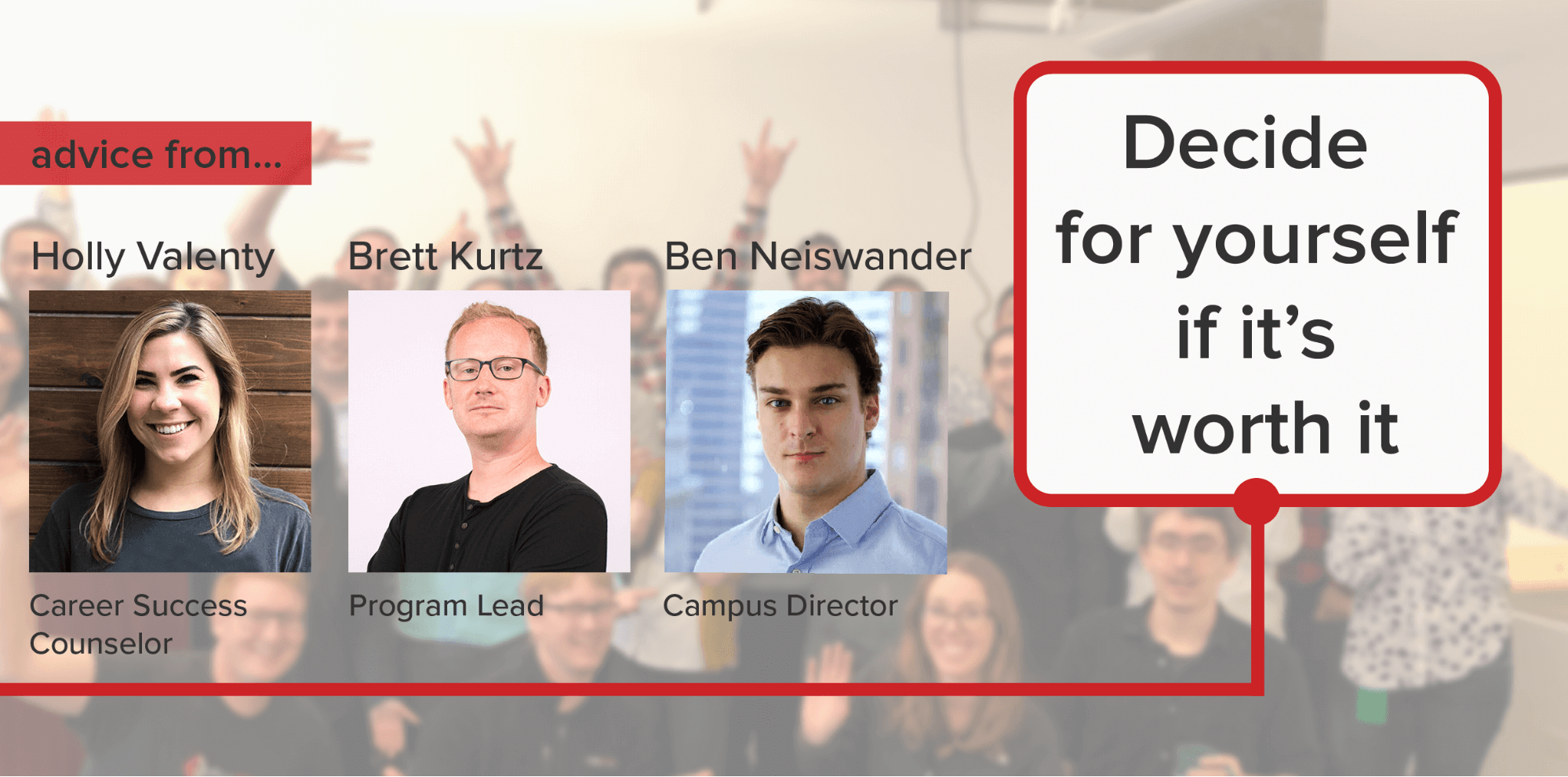How to Overcome the 3 Major Roadblocks to a Coding Career
By:
With programming now integral to so many roles—one man quoted in a recent article on the benefits bootcamps provide to degree-program grads said he was surprised to see upon applying to Deloitte that nearly every position he considered required or preferred programming skills—you'd be wise to wonder whether it's time to join the ranks of the career changers and aspiring developers leveraging coding bootcamps to reach their goals.
Programming can help you level up within your current industry, position you to completely switch roles and start fresh doing something you actually enjoy, and open you up to a new world of opportunity and networking. Sound like what you're looking for? Though all of these things are obviously appealing, we have to emphasize that the decision to attend bootcamp—or even learn to program at all—is highly individual. No matter how many stories of career changers or projected tech employment statistics you read, the fact remains that no one else's story can guarantee that this career path will make you happy.
What are the questions you really need to ask yourself before moving forward with coding or coding bootcamp? What should you evaluate to decide if you're on the right path? We visited with our Fullstack Chicago team to get their expert opinion on these questions. Every day, they help current students (and potential ones!) reach their goals, and they're happy to do the same for you.
Here's what they had to say:
Figure out if coding is for you

It's easy to see all the information out there and get excited about how a coding bootcamp can change your life—and it can--but you should make sure it's a life change you want. Lots of folks we meet start trying to decide if coding bootcamp is for them before they've even decided if coding is for them. A common case of cart before the horse, if you will.
Most coding bootcamps are very intense. You'll be eating, sleeping, and breathing code—coding all day, every day, for months. You won't have time to do, or even think about, much else. And while most students find the experience incredibly rewarding, no one would deny that it takes a lot out of you.
You don't want to be completely immersed in something that you end up not enjoying. So before you start thinking about bootcamp, figure out whether coding is for you. How do you do that?
- Start coding! There are so many free resources that enable you to try your hand at this new field before making a financial commitment. We like Codecademy, freeCodeCamp, and Codewars. Note how you feel as you learn different concepts and put them to use. Are you good at this? Do you like the challenge? Do you look up to find you've been coding for four hours without realizing it? These are good indications coding is for you.
- Socialize with other coders. Go to a meetup. Take a three-hour programming workshop. Sign up for a hackathon. Again, check in with yourself: Are you having fun? Chances are you're looking to exit your current job because it's not sparking joy, as it were, so you don't want to transition to yet another role you don't love. Also, it's a myth that programmers sit in dark rooms by themselves, surrounded by monitors. Programmers sit in offices and coworking spaces and work with other programmers, managers, and non-technical teammates and stakeholders. If you're considering a career in this field, make sure you enjoy being around--and communicating with--other people in the industry.
- Up the intensity level. Commit to a week- or month-long coding class. Does your appreciation of coding change when it's a regular obligation you have to show up for outside of work? Are you still smiling inside when it takes you a whole week to solve a problem, or when one small application seems impossible to build? Dialing up the commitment level can give you insight into how you'd feel if you were married to programming the way you will be during bootcamp.
Taking the time to explore coding, meeting people who share your interests, and diving in a bit deeper can help you figure out whether or not you want to pursue a career in coding.
That said, keep in mind that your own life and interests, as well as the job market, are never static. There is no guarantee that you'll still love this field in a decade or that there will always be job growth within tech--but by making this decision, you're choosing to mobilize toward what's calling to you now, and that's all you can ever do.
Pick a language, any language

So you've dabbled in coding and decided you want to go deeper. But here's another place analysis paralysis can set in: trying to find the one perfect language to start with. PSA: There is no one perfect language to start with. You could just throw a dart at a chart of programming languages and go from there—and you'd still be moving in the right direction. But if you want to be data-driven about selecting a language, use these criteria to help you choose:
- Check out Stack Overflow's latest Developer Survey. You'll be able to see what languages developers are actually using, how they like them, and what they're building with them. Some of the reasons we at Fullstack Academy focus on JavaScript (JS) include that it's used by every web application and is also the most versatile language, in that you can use it for both front-end and back-end development. Most compellingly, we've found that there are more job openings for JavaScript developers than for developers who focus on other languages.Anyway, while we are 100% JS nerds, you don't have to be. If you choose a different language to get started, we'll allow you to take our admissions assessment in that language. We know we can make you a JS convert soon enough ; )
- Ask yourself why you're learning to code. Most of our applicants want to get more lucrative work doing something that's actually fun for them. Some of our applicants want to build a specific product. In either case, do some research: Who's hiring in your area? What skills will you need to work for your dream company? What products are similar to the ones you want to build? What languages and frameworks were used to build them? Pick one of the languages that comes up while you're answering those questions—or at least one that seems like it will get you to your end point. Which brings us to our last point…
- Not all languages are easy. You'll want to start with one that is. Of course, everyone disagrees on what is "easy" because it's such a subjective measure, but check out this Quora thread. You'll see several languages coming up over and over again, which is a strong hint and great starting point. Picking one of those recommendations is a good idea; better to start learning something now than to keep putting it off in hopes of identifying the exact right thing.
Decide for yourself if coding bootcamp is worth it

Ah, the infamous question: "Are coding bootcamps worth it?" This is the biggest question we get asked, and yet the answer will be different for everyone. And every coding bootcamp is different, so while one bootcamp might be worth it for you, another may not be.
In any case, we're the wrong people to answer that question; only you can do that. So you need to ask more specific questions and do whatever it takes to get the answers. Here's a plan to figure it out for yourself:
- Write down a concrete goal. What is the number one thing you want out of your bootcamp experience? Be honest and specific. For example, do you want to graduate and be prepared to interview for junior developer positions at Google? Or are you an entrepreneur hoping coding bootcamp will teach you how to build your own site?
- Create a profile of yourself as a bootcamp candidate. It should include:
- How long you've been coding
- Your previous educational background
- How good you are at taking tests
- How quickly you learn
- How much you enjoy coding
- Why you want to enter the industry
- Any other relevant info about yourself you can think of
Plenty of bootcamp hopefuls we see at events or talk with over chat or email describe themselves as "total beginners," but then later reveal they've used VBA, studied Python, or know HTML for their current job. Yet they still identify as "beginners," which isn't objectively accurate, and--more importantly--doesn't convey to us their actual familiarity with code or their strength as bootcamp candidates.
- Reach out to grads from the bootcamps you're considering. You can do this a number of ways—by raising your hand at an alum panel, connecting via LinkedIn, or posting on Reddit or Quora, among others. Ask grads who are responsive to you if they'd be willing to share their own backgrounds, experiences, and outcomes. You can compare this info with your candidate profile and desired outcome to get an idea of whether bootcamp is the right way for you to reach that concrete goal you've identified.
We think talking with people who've already been through bootcamp and come out the other side is the best way to understand what you're getting yourself into, and to decide if it will be worth it for you, personally.
So get started ASAP! Check out our reviews on SwitchUp to find out what people loved and valued about their time at Fullstack Academy.
This post was sponsored by Fullstack Academy.

